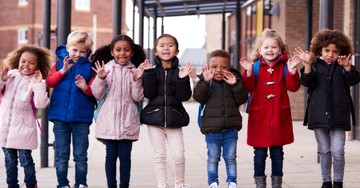These 9 "Normal" Parenting Habits Are Actually Really Harmful

I supported her head with one hand and her swaddled body with another. Easing her into the swing, I gasped when she woke screaming as I accidentally scraped her soft scalp against the swaddling apparatus. Despite our best intentions, parents do detrimental things.
In eighteen years of life, from cradle to adulthood, a child is put to bed over 6,000 times. Most parenting happens in daily doings. From complete dependence through a gradual move toward independence, parenting habits become the nutrition on which our kids feed and grow.
Once children grow into our peers, we have the time and presence of mind to reflect on how things went. We see result of our efforts.
It can be easy to plague ourselves with what we should’ve done. What we know is that most parents do their best.
Each finds their way through their hodgepodge of home influenced by culture, heritage, health, and individuality. By God’s grace, we do a lot of things well.
But we also have a lot of parenting habits that are actually really detrimental. While we can’t avoid every collision or crisis, knowing what to avoid can protect the soft hearts of our children.
Watch out for these 9 “normal” habits.
Photo Credit: ©iStock/Getty Images Plus/Choreograph
1. Over-Protection

1. Over-Protection
SLIDE 1 OF 5
Before a child comes into a home, parents-to-be get a list of how to “child proof.” Outlet covers and car seats precede knee pads and helmets. Outward signs of love communicate the value we place on the children we receive. Right?
Since “Children are a heritage from the LORD,” (Psalm 127:3a) we want to preserve their well-being. At playgroup, are the moms who love best the ones who protect the most? God entrusts them to us for a time, and we’re highly motivated to care for them.
Growing up inside a stream of reminders to “Be careful,” insulated in a structure of safety guidelines, children learn more than a healthy sense of risk assessment.
Instead, they may adopt a sense of uncertainty, even fear, about their world. Good intentions may foster a child’s skill of second-guessing their options, their potential, and their capacity to learn.
Overly careful parents may snuff out a sense of adventure, exploration, and confidence before it has a chance to emerge. If we’re to raise little ones into grownups with skills to make decisions and the courage to act in a world we can’t predict, there’s a caution for all our caution.
2. Distracting Kids from Pain and Disappointment
A toddler only has to scream or hurl their body on the floor to elicit a stream of distractions from a desperate parent trying to protect them from the pain.
And if rebellion or injury happens with an audience (God forbid the grandparents!), we pull out all the stops without. We question if parents with a quiver full of children “will not be put to shame,” (Psalm 127:5). Desperation leads us to distract our kids from reality.
Parents have moments when we respond to unhappy things like scraped knees, stolen toys, canned peas, and homework with pleas to think happy thoughts.
In desperate moments, we can miss the teachable moments. Typical incidents pose opportunities for toddlers to teens to learn to accept life’s hard things as well as good.
Instead of diverting attention from the worst moments, what if we help our kids open their eyes to the experience and learn from it? After all, disappointment and pain will enter every life.
When lips begin to quiver and eyes begin to tear, if we avoid the instinct to distract, we help children move towards health and holiness, instead of momentary happiness.
Photo Credit: ©GettyImages/Prostock-Studio
3. Including Children in Adult Activities Too Soon

3. Including Children in Adult Activities Too Soon
SLIDE 2 OF 5
Few families separate children from adults anymore. Some even put a child at the head of the table.
Out of a desire to include our kids, we may wrap them into adult things like parent conferences. Unfortunately, the seeds of taking part in adult things have the potential to create confusion about where they fit in the world. Children are, “like arrows in the hands of a warrior,” (Psalm 127:4a) but they’re not the warrior.
In an age of personal autonomy, well-intentioned parents normalize inclusion of little kids in big things. Child development, however, needs time to mature in areas of communication, vocabulary range, emotional intelligence, and experience.
Each child needs to fully flourish in each season if they’re to be unencumbered in the next.
The kids table is a place of freedom, where children can be children. The day will come when they move to the grown-up table.
There’s joy in being allowed to embrace a childish stage of life. Adulthood and the things of life will come in due time.
4. Teaching Them to Observe without Teaching Them to Act
Our desire to teach and protect often find space together in observation. “Come watch what I’m doing,” we invite. In time together, we pass on valuable information and skills. “Watch and learn” comes with our parenting instincts. This parenting method just needs to go further.
Observation falls short unless we hand over the opportunity to practice. Children are told to “keep” their father’s commands (Proverbs 6:20).
It will be messy, risky, and slow. It will require patience, restraint, and encouragement. But if we only invite children to observe the tire being changed without consciously handing over the jack and the wrench before crouching behind or standing up to coach, our children learn to be spectators in the work of life.
Inviting children into observation makes us feel good about parenting, because it’s good in so many ways. But until we move to the role of observer, and train our kids to take over, we’ve stopped short.
Photo Credit: ©Unsplash/Sai de Silva
5. Giving Information Instead of Instruction

5. Giving Information Instead of Instruction
SLIDE 3 OF 5
More information is available than ever before. Kids risk overlooking vital facts amid the tsunami of content.
Equally as dangerous, they risk becoming paralyzed by the data deluge. Parents aren’t able to provide all the information or reminders children need. No single parent has the bandwidth to access all of the content a kid needs for life.
Daily life provides opportunities for a child to grow in self-help. Keeping track of assignments, getting their gas, making their appointments, and researching their own applications are all moments when instruction trumps information.
When a child is told to listen to a “father’s instruction,” (Proverbs 1:8) it has little to do with information. Instead, the focus is on personal decision making based on guidance.
Rather than becoming their source of information to rely on, children need instruction in how to think about getting the information they need now and in the future.
6. An Undue Amount of Appreciation
Parents to want to grow grateful kids, so we teach by example. “Thank you for those kind words.” “Thank you for obeying quickly.”
An atmosphere of appreciation creates a good environment for childhood. But while appreciation pays off, inappropriate appreciation can create unrealistic expectations.
Children are told to honor your father and mother and to love their neighbors, (Matthew 19:19). But all effort is not appreciated.
Kindness and obedience are expected, along with normal things like buckling up, helping your sister, and eating your vegetables. We want children to grasp a truthful view of life.
More so, we want them to have a truthful view of God.
He lovingly provides, but God will not prop us up with a steady stream of thanks for obedience. Others will not keep up constant gratitude if well-meaning moms and dads set that precedent.
Teachers, employers, spouses, and children will expect responsible, loving behavior and won’t clap and cheer when they get it.
So although showing appreciation at times is a great thing to do, doing it all of the time will set up your kids with unrealistic expectations.
Photo Credit: ©Getty Images
7. Focusing Too Much on What Your Family Wants

7. Focusing Too Much on What Your Family Wants
SLIDE 4 OF 5
“Life-giving” made it into the top 10% of searched words according to Merriam-Webster. It has a place in all major dictionaries and in modern conversation.
People use it to describe what gives them enjoyment and vitality. The term finds its way into talk about needs and decisions in a world of offers and options. We want our family to do and have what’s “life-giving.”
What about being a family who gives life? A family who talks about the needs of others, gives to others, serves others, and makes decisions based on what’s good for others?
What if we raise children with a passion to give life to others, rather than children with their own life-giving choices as the focal point?
Kids listen to our positive parenting talk. They learn how important it is to prioritize what gives life.
But family fixations on life-giving decisions can be detrimental. It’s true Jesus came so we could have full life, (John 10:10) but our focus is not only on living to receive more life.
“Since God so loved us, we also ought to love one another,” (1 John 4:11). When family life focuses only on what’s life-giving for us, we lose perspective on God’s hope we’ll be a conduit of life to others.
8. Over-Sharing on Social Media
Social media is the modern parent’s journal. Before a child speaks, narration starts for the life they lead. Privacy and safety concerns begin with the first share, amplified by details and images. We’re 'gramming our kids and creating an online history telling the story of their life.
In 2016 a British study looked at “sharenting,” parents sharing photos of their kids on social media. At that time, before a child’s fifth birthday, an average parent shared nearly 1,500 images.
The visual trail of promotion follows children and can create challenges as they grow up and decide how to tell their own story.
“So in everything, do to others what you would have them do to you,” (Matthew 7:12). As our kids grow up, we want to build them up (Ephesians 4:29) with helpful words to benefit them. Kids have to live with the story we tell about the ones we live with.
From the moment we receive the small, swaddled person we call our own, it’s normal to work for a child’s happiness. We do our best in the work of parenting, but we are human.
In our efforts to protect, love, teach, support, nurture, and celebrate them, we may unintentionally damage our children. It may be normal to hide our failings, but by choosing to share the weaknesses with the arrows in our quiver, we point them in the direction of God’s grace for their lives too.
Photo Credit: ©GettyImages/Halfpoint
9. An Imbalanced Amount of Affection

9. An Imbalanced Amount of Affection
SLIDE 5 OF 5
God says offspring are, “A reward from him,” (Psalm 127:3b).
We cherish them so much we let them sleep between us, sit between us in church, prioritize Daddy-Daughter dances even though Mommy hasn’t been on a date in months, and celebrate every birthday as if it was a graduation.
We want our cherished children to feel our affection.
Simple decisions to simplify celebrations create a more realistic and healthy life for a child. Just because we can throw a big birthday bash, should we?
Just because we can pile presents beneath a tree, should we? Just because we can create professional annual photos, should we?
“Blessed is the man whose quiver is full of [children],” (Psalm 127:5a), but not when children are full of themselves. Normal parenting choices contribute to the concept a child develops of their self.
Careless affection can shape a growing self-concept into a narcissistic view of self. Without keeping our attention for a child in check, we risk sending a faulty message to a young mind.
Children need to know the value of others. They need to see the core of family as their parents’ commitment. They need to honor the worth of siblings. They need to look outside their own precious life to precious lives of others.
If we unintentionally treat children like the main attraction, they’ll grow up expecting to be the main attraction.
It will impede their ability to exercise empathy, serve others, bond with their own family, and value God’s love above all else. No parent wants their affection for their child to become toxic, but it can be.
Some of these truths may be hard to swallow. We love our kids so much, it’s hard to keep everything in perspective. But humbly keeping these boundaries in mind will serve you and your kids for years to come.
Photo Credit: ©GettyImages/photoguns

Originally published December 21, 2021.






